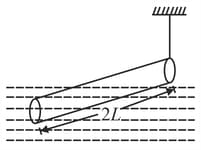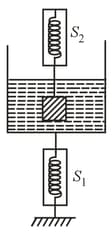Buoyancy and Archimedes' Principle
Buoyancy and Archimedes' Principle: Overview
This topic covers concepts, such as, Buoyant Force, Archimedes Principle, Buoyancy, Relative Density of a Substance by Archimedes Principle & Archimedes Achievement in Science etc.
Important Questions on Buoyancy and Archimedes' Principle
Two cylinders of same cross-section area and length but made of two material of densities and are cemented together to form a cylinder of length . The combination floats in a liquid of density with a lengthabove the surface of the liquid. If , then
A container of large surface area is filled with liquid of density . A cubical block of side edge a and mass M is floating in it with four-fifth of its volume submerged. If a coin of mass m is placed gently on the top surface of the block is just submerged. M is
A slender homogeneous rod of length 2L floats partly immersed in water, being supported by a string fastened to one of its ends, as shown. The specific gravity of the rod is 0.75. The length of rod that extends out of water is

A cuboidal piece of wood has dimensions a, b and c. Its relative density is d. It is floating in a large body of water such that side a is vertical. It is pushed down a bit and released. The time period of SHM executed by it is
Two cubes of size sides, one of relative density and another of relative density are connected by weightless wire and placed in a large tank of water. Under equilibrium the lighter cube will project above the water surface to a height of
What is the effect of the temperature of the fluid on the buoyant force?
If a plastic ball is put on the surface of the water on the moon, it will:
A ball whose density is falls into water from a height of . The depth upto which the ball sinks is ____.
Which of the following is the SI unit of relative density?
A hollow metal of mass contains a cavity of volume . The metal when placed in water displaces of water. The specific gravity of metal is:
If weight of a body and buoyant force exerted by the liquid on it, then the body will remain floating with some portion of it above the liquid surface when -
It is necessary to mention the temperature at which specific gravity is calculated because
The relative density of any substance is equal to the ratio of the mass of any volume of the substance to the mass of an equal volume of water.
What is the density of pure water in the SI system (in )?
A hollow metal of mass contains a cavity of volume . The metal when placed in water displaces of water. The specific gravity of metal is:
A balloon has volume of . It is filled with hydrogen . If the density of air is , then it can lift a total weight of
A cubical block of steel of each side equal to is floating on mercury in the vessel. The densities of steel and mercury are and . The height of the block above the mercury level is given by
A ball of relative density falls into the water from a height of . The depth to which the ball will sink is (neglect viscous forces)
A beaker containing water is kept on a spring scale. The mass of water and beaker is . A block of mass and specific gravity is suspended by means of thread from a spring balance as shown in the figure. The readings of scales and are respectively (Take ).

